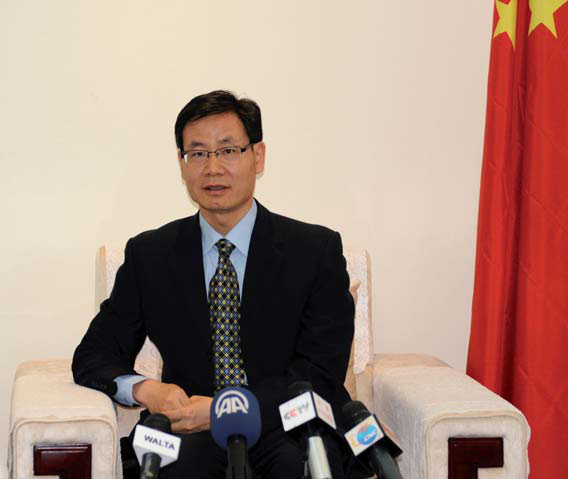Locals continue to sing praises of Chinese doctor
Leader of China's first medical corps in Ethiopia remembered with gratitude 40 years later
In 1975, the remains of Mei Gengnian, a leader of China's first medical corps to be sent to Ethiopia, were buried in the suburbs of Jimma, a city 355 kilometers southwest of Addis Ababa, the capital of Ethiopia.
Over the past 40 years, a local family from Jimma has volunteered to guard the cemetery as an offer of gratitude and respect to the memory of Mei and the Chinese medical corps.
|
La Yifan, Chinese ambassador to Ethiopia. |
This year marks the 45th anniversary of the establishment of diplomatic relations between China and Ethiopia. I was deeply touched by Mei's story. The friendship between China and Ethiopia, or China and Africa, was built by the efforts and fearless sacrifices by people like Mei.
Born in a poor family in Hebei province in North China in 1924, Mei joined the War of Resistance Against Japanese Aggression (1937-45) as a young man. He went to medical school at the age of 21 and saved many lives during China's civil war from 1945 to 1949.
After the establishment of the People's Republic of China in 1949, Wei continued his medical work. As an expert on angiography, he helped build several hospitals in the country.
In 1973, Mei came to Jimma as the leader of the first Chinese medical corps in the country.
The work of the corps was busy and stressful. Living in a foreign country with a tough environment, as well as hypertension and heart disease, Mei worked tirelessly. He once conducted seven surgeries and treated 313 patients in a single day.
In 1975, Mei and his team traveled to Kaffatown in southwest Ethiopia to provide disaster relief. Mei was killed in a car accident on the way back to Jimma from Kaffatown. The doctor was 51 at the time.
After Mei's death, the Ethiopian government held a solemn memorial service and built a tombstone in his honor. Today, locals can be found cleaning the tomb and gathering near the surrounding square.
Every time we pay our respects to Mei's tomb, we are surprised by the praises sung by local residents.
Since 1974, China has sent 20 medical corps, more than 300 doctors and nurses to Ethiopia. The corps have treated more than 2 million patients, conducted 74,165 surgeries and rescued 42,814 victims across the country.
Mei and the corps are one of many forms of aid that China has sent to Africa. Since 1963, China has offered the help of about 20,000 doctors to 51 African countries and regions.
Those doctors have treated millions of patients in Africa and have helped local residents improve their sanitary conditions and hygienic practices.
Moreover, they have also passed on their medical knowledge and skills to local doctors. Today, China's medical corps can be found in 43 African countries.
With the development of China-Ethiopia and China-Africa ties, medical cooperation between the two sides is expanding.
Last year, shortly after Ebola broke out in West Africa, the Chinese government airlifted medicine to affected areas.
When the epidemic began, the Chinese government actively participated in the construction of centers for disease control in many African countries.
The Forum on China-Africa Cooperation will be held in Johannesburg, South Africa, on Dec 4 and Dec 5. The cooperation between the two sides on medical treatment and public health will be one of the most important topics to be discussed at the forum.
I believe Mei and the other 50 doctors who have died in Africa would be pleased if they could see the major developments in China-Africa cooperation in healthcare. I hope they all rest in peace.
The author is the Chinese ambassador to Ethiopia.



















